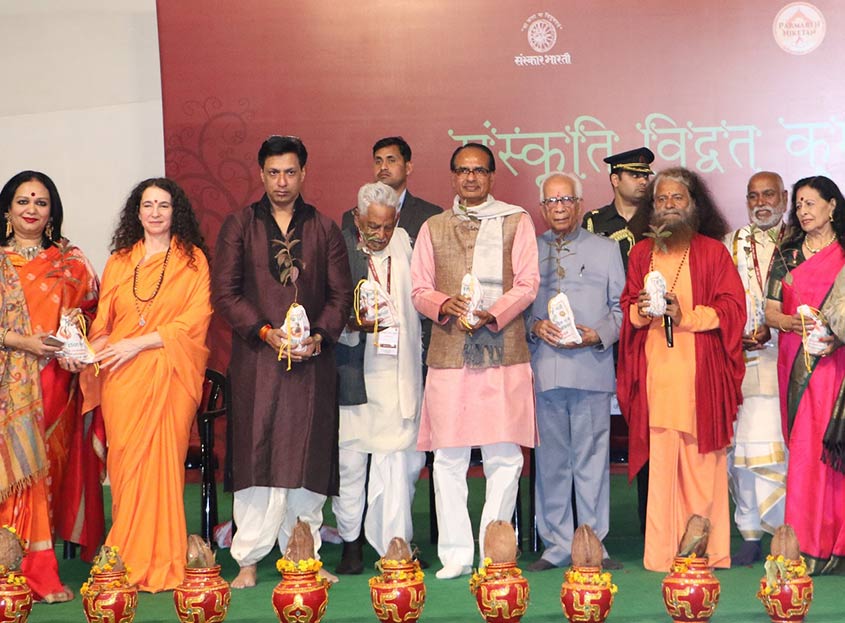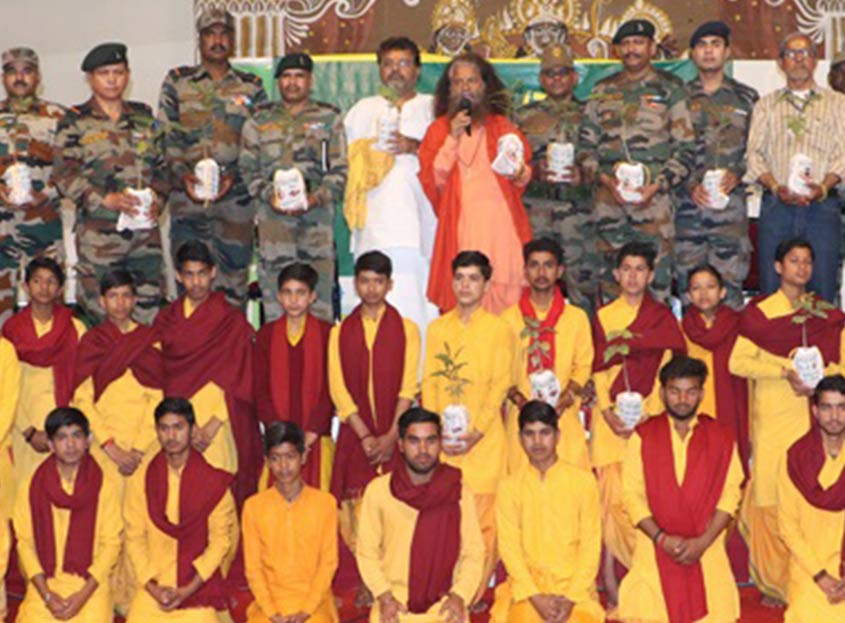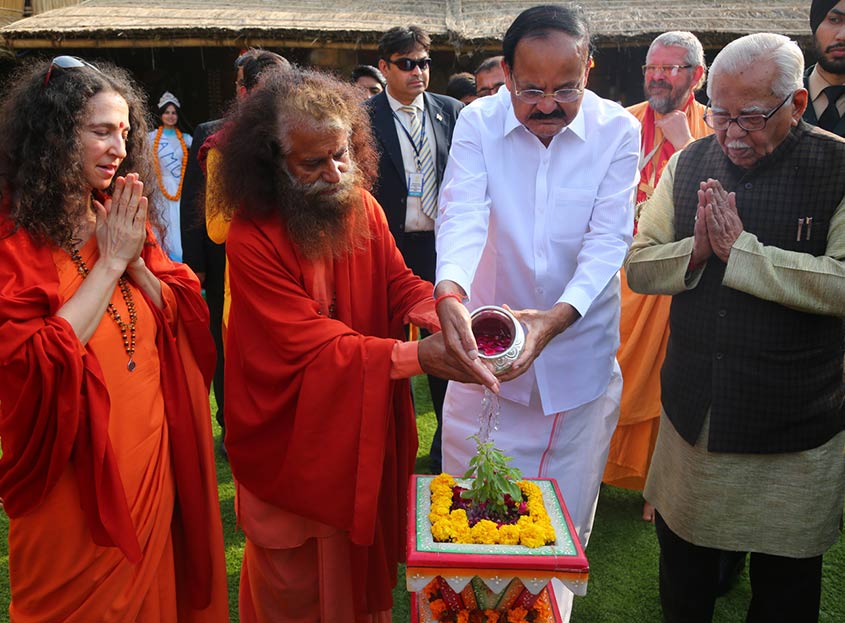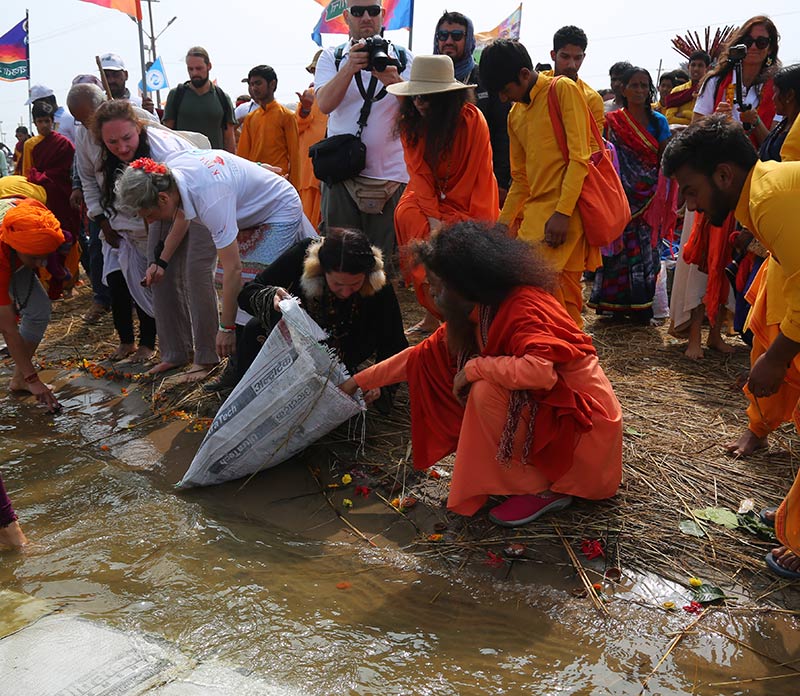Join Us for an Eco-Friendly Green Kumbh Mela!
Parmarth Niketan, along with Ganga Action Parivar and other affiliated organizations, is spearheading the “Green Kumbha Initiative.” This program aims to beautify the Kumbha grounds and surrounding areas while ensuring the health and well-being of festival attendees.
By spreading awareness and education about the importance of sustainability, we hope to inspire pilgrims from around the world to become stewards of the environment. We invite you to participate and help us make this Kumbha Mela an eco-friendly celebration!





Green Kumbh & Tree Plantation
In preparation for the Kumbha Mela, Parmarth Niketan, Ganga Action Parivar, and affiliated organizations are encouraging tree planting by offering saplings as prasad to pilgrims. This initiative aims to inspire attendees to contribute to a clean and green festival. As these saplings are planted and nurtured, they will grow into beautiful canopies that provide shade, bear fruit, prevent soil erosion, and release moisture into the air, enhancing the environment for all, whilst also reminding devotees of their pledge to become stewards and guardians of our environment and Mother Earth.
Public Participation and Awareness
We invite yatris, partners, and local residents to join our efforts in making the Kumbha Mela a clean and green event. Volunteers will guide attendees to sanitary facilities, trash receptacles, and water taps, and provide information on sustainable waste disposal practices. Regular clean-ups and rallies will be conducted to raise awareness of environmental responsibility. A comprehensive outreach campaign, featuring media, hoardings, posters, videos, street plays, gatherings of renowned faith leaders, special music programs, concerts, and nightly Sangam Aartis, will educate and inspire everyone to protect and cherish the environment. By participating in these activities and taking home tree saplings as prasad, we aim to foster a community dedicated to environmental stewardship.


Reduce Plastic Waste and Sustainability
To reduce plastic waste and promote sustainability, we are establishing a plastic-free camp. This initiative includes providing filtered water taps and distributing low-cost reusable water bottles to minimize single-use plastics. We are also striving to ensure that the camp and all materials used are as eco-friendly as possible. By encouraging attendees to use these resources, we aim to keep the grounds clean and free from plastic litter.
Support Us in Creating a Clean and Green Kumbh
To reduce plastic waste and promote sustainability, we are establishing a plastic-free camp. This initiative includes providing filtered water taps and distributing low-cost reusable water bottles to minimize single-use plastics. We are also striving to ensure that the camp and all materials used are as eco-friendly as possible. By encouraging attendees to use these resources, we aim to keep the grounds clean and free from plastic litter.
In addition to our efforts, we request pilgrims and devotees to help us
by making your Kumbh green:
- Reduce Waste: Use reusable products like plates and cups instead of non-biodegradable materials such as plastic. Clean drinking water is available to refill your reusable water bottles!
- Avoid Plastic: Minimize consumption of plastic and polythene. Try to buy items not wrapped in layers of plastic whenever possible.
- Carry Eco-Friendly Bags: When visiting other areas of the camp or market, bring your own cloth or jute bags (jhola) instead of accepting plastic carry bags.
- Refuse Plastic Bags: Absolutely refuse plastic and polythene bags, even if offered.
- Proper Waste Disposal: Always look for trash bins located throughout the Kumbha grounds to dispose of your waste properly. If you cannot find a trash bin nearby, hold onto your waste until you find one.
- Protect Sacred Waters: Never throw litter on the ground or into the sacred rivers, as it harms animals and the environment.
- Conserve Water: Save precious water by turning off taps while brushing or shaving, and minimize water usage while bathing.
- Save Energy: Turn off lights when leaving a room and use them only when necessary.
- Choose Vegetarianism: The meat industry contributes significantly to global warming and environmental destruction.
- Avoid Animal Products: Do not wear clothes made of animal furs or leather, or use products made from these materials, as their production pollutes the rivers.
- Respect Heritage Sites: Do not engrave or paint on monuments or heritage buildings; keep public places clean and green.
- Avoid Spitting: Do not spit on roads or public places and educate others to avoid doing so.
- Promote Eco-Friendliness: Educate your household, workplace, and community on living in an eco-friendly way.
- Dispose of Puja Materials Properly: Do not throw puja or havan items, including flowers, into the river. Instead, place biodegradable materials like samagri and flowers in designated bins.
- Offerings at the Sangam: Ensure offerings are 100% natural and biodegradable (no plastics!). Remove offerings from plastic bags and recycle the bags before placing them in the Sangam.
- Use Proper Sanitation Facilities: Never use the Sangam or any water body as a bathroom. Instead, use community toilets in the camp and Kumbh Mela grounds.
- Avoid Laundry in Rivers: Do not do laundry in the Sangam, and if you must, avoid using detergents, as they harm the river’s ecosystem.
Support Us in Creating a Clean and Green Kumbh
To reduce plastic waste and promote sustainability, we are establishing a plastic-free camp. This initiative includes providing filtered water taps and distributing low-cost reusable water bottles to minimize single-use plastics. We are also striving to ensure that the camp and all materials used are as eco-friendly as possible. By encouraging attendees to use these resources, we aim to keep the grounds clean and free from plastic litter.
In addition to our efforts, we request pilgrims and devotees to help us
by making your Kumbh green:
- Reduce Waste: Use reusable products like plates and cups instead of non-biodegradable materials such as plastic. Clean drinking water is available to refill your reusable water bottles!
- Avoid Plastic: Minimize consumption of plastic and polythene. Try to buy items not wrapped in layers of plastic whenever possible.
- Carry Eco-Friendly Bags: When visiting other areas of the camp or market, bring your own cloth or jute bags (jhola) instead of accepting plastic carry bags.
- Refuse Plastic Bags: Absolutely refuse plastic and polythene bags, even if offered.
- Proper Waste Disposal: Always look for trash bins located throughout the Kumbha grounds to dispose of your waste properly. If you cannot find a trash bin nearby, hold onto your waste until you find one.
- Protect Sacred Waters: Never throw litter on the ground or into the sacred rivers, as it harms animals and the environment.
- Conserve Water: Save precious water by turning off taps while brushing or shaving, and minimize water usage while bathing.
- Save Energy: Turn off lights when leaving a room and use them only when necessary.
- Choose Vegetarianism: The meat industry contributes significantly to global warming and environmental destruction.
- Avoid Animal Products: Do not wear clothes made of animal furs or leather, or use products made from these materials, as their production pollutes the rivers.
- Respect Heritage Sites: Do not engrave or paint on monuments or heritage buildings; keep public places clean and green.
- Avoid Spitting: Do not spit on roads or public places and educate others to avoid doing so.
- Promote Eco-Friendliness: Educate your household, workplace, and community on living in an eco-friendly way.
- Dispose of Puja Materials Properly: Do not throw puja or havan items, including flowers, into the river. Instead, place biodegradable materials like samagri and flowers in designated bins.
- Offerings at the Sangam: Ensure offerings are 100% natural and biodegradable (no plastics!). Remove offerings from plastic bags and recycle the bags before placing them in the Sangam.
- Use Proper Sanitation Facilities: Never use the Sangam or any water body as a bathroom. Instead, use community toilets in the camp and Kumbh Mela grounds.
- Avoid Laundry in Rivers: Do not do laundry in the Sangam, and if you must, avoid using detergents, as they harm the river’s ecosystem.



